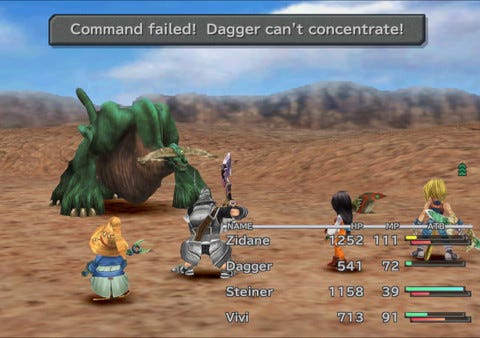
Why I Love: Command Failed [Final Fantasy IX]
‘Why I Love’ is a series of lessons I’ve learned from my favorite game mechanics.
Let’s say we’ve bought this new game called Dark Souls. We’ve heard great things about it from our friends. It’s got an awesome world and cool monsters. We get to level-up our character however we want, explore wherever we want, and use whatever weapons and armor we want. But when we start playing, we learn something very quickly: the game is hard. In fact, we die so often and in such cruel ways that we simply decide to stop playing. For some of us, this may be the case for why we quit, but for others, this is precisely the reason we keep playing. It may seem contradictory, but Self-Determination Theory (SDT) helps to explain it and shows how the mechanic from Final Fantasy IX works so well in spite of the seeming contradiction.

There are three conditions that fuel people’s motivation in SDT. One, relatedness: we do things because it brings us closer to other people. Our friends like Dark Souls, so we decided to try it out. Two, autonomy: we need to feel like we’re in control. We decide how our character acts, where we go, and what weapons/armor we use. And lastly, three, competence: we want to feel like we have the skills to succeed. When we die, it puts our competence into question. The reason some people quit and why others keep playing only appears to be a matter of competence.
Players who quit Dark Souls often do so on the basis of autonomy rather than competence. “The enemies gang up on me all at once”, “their attacks are random”, “the game is unfair”. The players feel like no matter how well they play or how much they improve, the game is not putting them in a position to succeed. They don’t feel in control and, so, lose their motivation to continue playing. This isn’t to say that this is the only reason people stop playing but to show how important it is to maintain the player’s perception of autonomy and competence. Now, what happens when a game decides to break those perceptions on purpose?
For combat in turn-based RPGs, you select what you want the characters to do, and then they do it. But what if one specific character has a chance to, instead, do nothing? You obviously aren’t in control, so there goes your sense of autonomy. And because they do nothing, you now have a higher chance of game over-ing. It’s frustrating. It makes you question why it’s even a thing. But this is what happens in Final Fantasy IX.

At some point in Disc 3, your party’s primary white mage and resident princess, Garnet, has a chance to, instead of whatever you wanted her to do, have this message pop up instead: “Command Failed! Garnet can’t concentrate!” Needless to say, it’s frustrating. It makes you question why it’s even a thing. But when you play through the game, you understand why. In the time before this mechanic is introduced, her kingdom was utterly destroyed, and her mother, the queen, was killed.
What keeps us invested in the game (and her character) is not the sense of autonomy or competence. It’s the third condition of SDT: relatedness. Tragedy affects us in different ways. Garnet’s is to withdraw within herself, to the point where she becomes so despondent that she cannot act. Her inaction connects us to her. We empathize with how she must feel. It may be incredibly frustrating as the player when she doesn’t take the action we want her to, but we don’t let that emotion get the better of us. Even on the flip side of the same coin, we feel relieved when she’s able to “act as normal”. We accept all this and continue to play because we accept her feelings.
Lesson: Mechanics are an extension of character.
If we look at Dark Souls, there is little to no relatedness between us and the avatar. It merely exists for us to run, roll, and attack our way through the world. Relatedness manifests instead in our connections to other players. We vent to our friends about the trap that killed us. Or watch someone’s bloodstain in-game, and see them suffer our same fate. Garnet’s inaction is much the same way. The mechanic exists not to challenge our skills of strategy or knowledge but to challenge our skill of empathy. Empathy, not for another player, but for a virtual character real enough for us to care.
